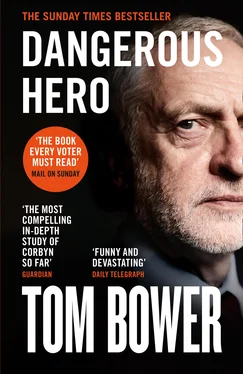Corbyn was deaf to such complaints. Taxing the rich was right; he disputed the possibility of any permanent damage. In the cause of building socialism, he also opposed modernisation, including widening a main road that ran through his borough. During a delegation’s visit to Bill Rodgers, the new junior minister at the department of the environment, he had gone into a long harangue. Rodgers had retorted, ‘You are tiresome, Councillor Corbyn.’ Far worse humiliations followed. He was fired by the AUEW: his research was judged unacceptable. Corbyn would explain his sacking by saying that he had been a target in the clearout of leftists. His boss, he claimed, had decided that his celebrating the American withdrawal from Vietnam, continually attending political meetings or standing on picket lines across the country, was unwelcome. In reality, without an academic background, he lacked the skills to present a cogent analysis of political and economic issues. ‘He never told me he was sacked,’ recalled Chapman, whose own career was advancing: she had been selected as Labour’s parliamentary candidate for Dover and Deal, a Tory marginal.
Once again, fortune intervened. NUPE, the trade union for public employees led by Alan Fisher, an ambitious left-wing firebrand, was recruiting officials to increase its membership among the underpaid. Replying to an advertisement, Corbyn arrived in Charing Cross for an interview. Reg Race, at that time the NUPE official in charge of the process, looked at the bedraggled applicant, whom he had never seen before.The Brylcreemed panel of men conducting the interviews, Race knew, would never consider someone wearing unpolished shoes, no jacket, and an un-ironed grey shirt, open at the collar. ‘Go down The Strand, buy a tie and smarten up, or else you’ve got no chance,’ he advised.
On this occasion Corbyn did as he was told, and in truth the union had every reason to employ him. He was tirelessly active and a committed socialist, respected by both the Hornsey Labour Party and the Haringey Labour group. He was duly hired as the organiser for two London boroughs, Barnet and Bromley, a job that gave him responsibility for the area’s low-paid Inner London Education Authority (ILEA) workers, mostly school dinner ladies and caretakers. Given an old green car, he toured his domain in what Keith Veness, also a NUPE official, called ‘a sinecure job’. Corbyn was in seventh heaven. He had status and a good income. As an outstanding recruiter – the union’s membership would increase from 50,000 to 250,000 over the following seven years – and a keen organiser of strikes, he quickly won popularity with the union’s five hundred dinner ladies. However, he had nothing in common with the macho Cockney dustmen swearing over their pints down the local. In an attempt to win their acceptance he renamed himself ‘Jerry’ – no dustman would bond with a Jeremy – and, to avoid their hard-drinking sessions, would make his excuses and go off early to join another picket line.
During his endless discussions with like-minded allies, Corbyn saw Britain’s industrial turmoil, rising interest rates and the collapse of the value of the pound as an opportunity to destroy capitalism. Ranged against Labour were the enfeebled Conservatives, led since February 1975 by Margaret Thatcher, who held that Britain was ruled by the unions, the majority of which were controlled by committed Marxists and agents of Moscow. In that febrile atmosphere, right-wing elements in the military, the City and the media plotted to stage a coup against Wilson, whom they suspected of being a KGB agent because of his regular trips to Moscow in the years immediately after 1945. Corbyn would not have been surprised if the plot had been implemented. Reports from America described the White House orchestrating military coups, assassinations and invasions across Africa, Asia and Latin America. The oppression and torture carried out by the military dictatorship in Chile particularly appalled him. The atmosphere of paranoia and persecution was agitated by leaks from committees in Washington investigating the Nixon government’s secret operations. Adding to the hysteria, ‘experts’ forecast that by 2000 the world would be convulsed by widespread famine, followed by total destruction. The uncertainty excited the left.
In March 1976, Harold Wilson resigned as prime minister because of ill health. In the first round of voting among the 313 Labour MPs to choose Wilson’s successor, Tony Benn and Michael Foot, both left-wing unilateralist disarmers, together outscored James Callaghan, the right-wing candidate, with 40 per cent of the vote. In the final ballot, Callaghan got just thirty-nine more votes than Foot. The left did not feel defeated. Corbyn and his allies interpreted the loss as a temporary blip, and an incentive to redouble their efforts.
Callaghan proposed to cut public spending in an effort to halt the country’s slide towards bankruptcy. Benn disagreed, offering as an alternative a siege economy that limited imports and confiscated even more money from the wealthy. The government was split. Many middle-class Britons feared that proletarian hordes, led by a Bennite commissar, would be incited to seize their property. In Haringey, Corbyn and his brother Piers, himself by now a Trotskyite candidate in a local election, led squatters into unoccupied houses across London. Piers’s group even picketed the home of Hornsey Labour Party member and GLC councillor Douglas Eden near Muswell Hill to protest against the GLC seeking to have unauthorised occupiers expelled from empty properties. Alarmed, Eden telephoned Corbyn to ask him to intervene. It did no good. ‘Corbyn waffled because he supported the squatters,’ said Eden, who realised too late that Corbyn equated his own ambitions in Haringey to those of Salvador Allende’s Marxist government in Chile.
In that febrile atmosphere, Corbyn and Chapman set off on his 250cc Czech motorbike in the summer of 1976 for a camping holiday across Europe. ‘Jeremy always chose to go on holiday in August,’ explained Chapman, ‘because there were no political meetings.’ To her distress, her husband showed no interest in her political duty to nurse her constituency in Dover in preparation for the next general election, nor in her academic work. She also feared that the holiday would be as uncomfortable as the previous year’s in France, Spain and Portugal. The ordeal was not just riding pillion on Corbyn’s bumpy bike, but his passion for abstinence. While Chapman wanted to sleep in a proper bed at night and eat in interesting restaurants, Corbyn insisted on a small tent and cooking tins of beans on a single-ring Calor gas stove. The nearest Chapman got to comfort was after a rainstorm flooded their tent outside Prague. Begrudgingly, Corbyn agreed to spend the night under cover – not in a hotel, but in a student hostel. He became furious when his motorbike broke down in Czechoslovakia, assuming that because it had been manufactured there it would be easy to have it repaired. Instead, he was introduced to the realities of a communist economy. The bike had been made exclusively for export, and no Czech garage mechanic knew how to fix it, or where to obtain spare parts. For two days he fumed until it was finally repaired.
During their journey, Chapman discovered that her husband was not interested in equality within marriage, or in sharing any domestic chores: ‘Women living out their sex lives as a personal statement was ignored by him,’ she recalled. ‘He never spoke about sex, music, fashion or books. He put class first.’ Equally distressing was his indifference to Europe’s most beautiful cities. In Vienna, he refused to enter the palace of Schönbrunn, the Kaiser’s summer retreat, because it was ‘royal’. ‘You go in,’ he told her. ‘I’ll stay outside.’ European culture offended him. Oblivious of his surroundings, he stood in Vienna’s beautiful Ringstrasse and pronounced it ‘capitalist’. He walked past all the museums and art galleries, and found no pleasure in medieval towns. In villages, he was interested to watch the peasants going about their lives. In Prague, soaking wet from torrential rain, he did not lament a missed visit to Hradčany castle, and turned down a walk through the old town. Nor did he comment on the dilapidation of the city’s old buildings, all neglected by its communist overlords. ‘Preservation of architecture and heritage,’ recalled Chapman, ‘didn’t appear to be on his agenda.’ For similar reasons he had always refused to accompany her to Paris, where she did occasional research, or to Los Angeles to visit her aunt. He spoke only about elections, campaigns and demonstrations, although his knowledge even of these was incomplete. Strangely, considering his claims forty years later of his profound sympathy for South America’s indigenous people, he never mentioned that supposed fascination to her. By contrast, he expressed a deep interest in Britain’s manhole covers, especially their dates of manufacture: ‘My mother always said there’s history in drain covers. So most people think I’m completely mad if they see me taking a picture of a drain cover, but there we are.’
Читать дальше










